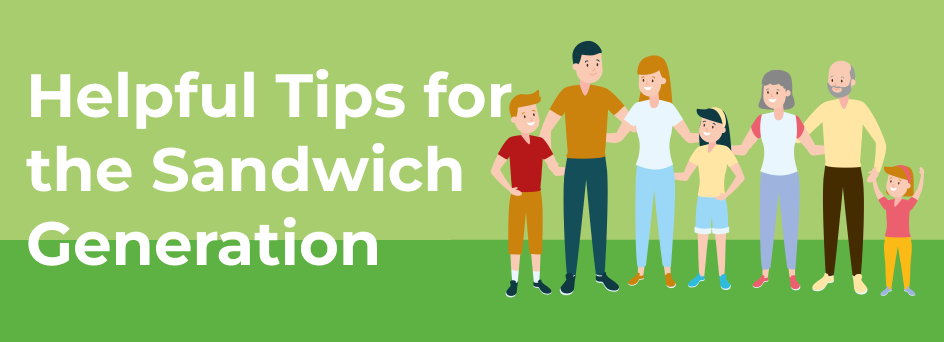Helpful Tips for the Sandwich Generation and Caregivers
I think many of you know that I have two kids. In addition, I help take care of my 84-year-old father. I am in what’s known as the sandwich generation, those who are providing care, and even financial support to two generations, their children and their parents. They are squeezed or “sandwiched” in all areas -time, energy, and resources, therefore the name.
Since I’ve been navigating this path for a few years now, I’ve learned a few things. November is Long Term Care Awareness Month, so I thought it would be timely to talk about care for our elderly parent or relative. I’d like to share some helpful tips if you happen to be caring for an elderly or find yourself “sandwiched”.
Accept it as part of life
When I realized that my parents were at that age when they needed help, I worried that I would not be able to manage to add one more thing to my already full plate. But reprioritization has helped me be clear on what really matters and not feel so overwhelmed.
Make a list of things you have to do for today. Then rate each one in priority from 1 to 3. 1 being those that need urgent attention, they need to be done now. 3 being the least important, they can be put off.
Narrow down your list to doing the 1s and just focusing on those. You can go down to the 2s next and the 3s last if you still have time. The 3s can wait, they won’t leave an impact if it’s put off until later. Do this every day.
Have family pitch in
This is very important. You don’t have to do it all. Make a list of things that your parent needs help with and talk to your siblings or children if they are old enough to help. For example, are they forgetting to take their medications and therefore need help making sure they take their medications? Do they need help cooking, bathing, or cleaning the house?
Don’t try to do it all on your own. I’ve asked my children to do little tasks like bringing food and medications because this teaches them to help. They can also spend time with their grandparent doing an activity they enjoy. As they grow, they can help with more complicated tasks like setting the pills in the pill organizer.
Gather all resources
Who and what can you tap into for help? Who are friends and family who can help your parents when you go on vacation, or when you have to go to work? Take a look at what your parents have in place to help care for them in addition to friends and family. Local church ministries and nonprofits can be another resource if you need help caring for your parent. Be sure to reach out to them.
Do they have money saved for long-term care? Do they have long-term care insurance? This will help you be prepared for what is to come.
Medicare does not cover extended care or long-term care, where care is needed for longer than 100 days. Care may be provided in the home, a nursing facility, or assisted living facility.
Medi-Cal in California, or Medicaid in other states, covers extended care but it’s difficult to qualify. Eligibility depends on income and family size. For a married couple to qualify, the maximum income level should be $24,353 per year. You’ll need to apply and submit documents showing proof of income which need to be 138% of the poverty level (this ceiling varies by state), statements of bank accounts, and other assets owned.
Only 18.4 of Americans are covered by Medicaid. The rest of the population needs to use their own savings, and retirement funds or have no choice but to rely on a family member for care.
Long-term care insurance can protect your assets, spare your family from financial and emotional stress, and put you in control of your health decisions. If your parents do not have one, it will be good for you to look into getting one for yourself.
Safety is a priority
This is where my Physical Therapy background comes in. There are many things you can do to keep your elderly safe in their own home. Do a walk-through of the house and look for fall hazards, like loose rugs, pathways that are not well-lit, or not wide enough to accommodate a walker or wheelchair. Make sure there is enough light for them to see at night and move furniture so they can have more freedom of movement within their home.
Having the right DME (durable medical equipment) and a way to call for assistance if they fall, are also important considerations. Kaiser members can get a device that allows them to call for emergency or urgent care assistance with a push of a button, at a discount. This is good to have if they are alone at home for any length of time.
Thanks to Amazon and online shopping, access to DME has never been easier. We remodeled our bathroom because my dad had fallen in the shower twice. We removed the shower doors and got him a tub transfer bench. Then we installed a grab bar in the shower and changed the shower head holder so it’s movable up and down. This is one of the things you will need to pay for.
Medicare does not cover bathroom remodels or upgrades, not even the shower or bath chairs. Medi-Cal covers bath and shower chairs and grab bars.
Home modifications don’t have to break the bank. Check out Habitat for Humanity if they have what you need for your home remodels at extremely discounted prices. You can get used DME like bath chairs, walkers, and others from Savers, or your local Goodwill store.
If your parent is homebound, he/she may be eligible for home health services. You can ask your primary care doctor to refer you to home health Physical Therapy to come to your home to assess home safety and prevent falls. A medical social worker can provide community resources and other options for care if needed.
To drive or not to drive
This is not an easy one, especially if your parent believes they are still capable of driving. Nobody likes to have their freedom taken away from them. Be patient and understanding. Give them time to process and accept this loss as well as the loss of other abilities.
Look for signs of depression which is common at this stage of life- excessive sleep, lack of interest in the usual activities they enjoyed, isolation, decreased appetite, and food or water intake. Contact the primary care doctor if you think they may be suffering from depression.
End-of-life conversation
This is probably the hardest to talk about but it needs to be done. Estate plans and advanced directives are good to have to make sure their wishes are honored when they are very ill and after death. Drawing a will or estate plan requires professional help. While I do not offer this type of service, I know a few estate attorneys whom I trust.
These conversations have given us the opportunity to bond, to ask questions about what is important to them, and how they want to be remembered. We talked about distant memories and saw them in a different light. For example, one of the things a friend of mine did was record these stories so the grandchildren and future generations would be able to hear or read them. For us, it’s creating a family tree chart.
Conclusion
Caring for an elderly adult can be stressful but it can also be rewarding. I feel blessed that I have the background and experience to face these challenges with my dad. I’m grateful for my family who pitches in, my husband and kids, my mom and sister. It is important that you build a team that can help you make the right choices. Get the help of professionals which starts with your doctor. If you have any questions, reach out to me and I will do my best to help you.
DOWNLOAD MY LATEST EBOOK: HOW TO FUND YOUR WORRY-FREE RETIREMENT.
*Do you know that my Dignity Plan focuses on 3 often forgotten, but super important areas: The 3 L’s: Longevity, Long Term Care, and Legacy? Having a Dignity Plan can help you sleep better, and stop feeling anxious. Schedule a time to set up your Dignity Plan here.
**Have you recently had a DBMDR (Death, Birth, Marriage, Divorce, or Retirement) and need help getting your financial plan in order? Schedule a meeting with me. If you know a widow or widow, share my Loss of a Loved One Insurance and Financial Checklist for a guide and list of things they need to do.
***I’m looking for women who want to be empowered about their career choices and income and start a meaningful and fulfilling business in Financial Services. If you know someone, have them contact me.
Sheilla Vidal is a Retirement Income Certified Professional RICP® and life insurance broker. Sheilla is also a physical therapist, wife, mother of two, and one of the caregivers for her 85-year-old father. She is an avid learner. She writes, speaks, and recognizes that her work in helping clients live with dignity is her God-given mission.



